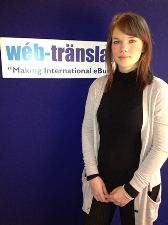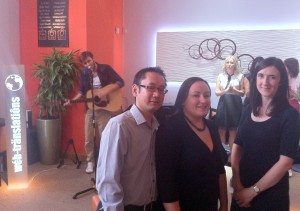Most Valuable Translator Awards – 2023
We hope 2024 has got off to a good start for you! It’s January again, which can only mean only thing… it’s time to announce our Most Valuable Translator Awards.
In order to show our appreciation for our linguists, each January we like to announce our Most Valuable Translator Awards. Translators who are given this accolade are those who have repeatedly gone the extra mile and who have helped us when we have needed them most.
It of course goes without saying that we are incredibly grateful for all of our freelance translators’ help and really value all of their hard work. They respond promptly, produce high-quality translations, and are always kind! It is truly a pleasure to work with them all. It is so difficult to choose just 15, as each one of them works so hard and it’s a pleasure to work with you, so thank you to you all!
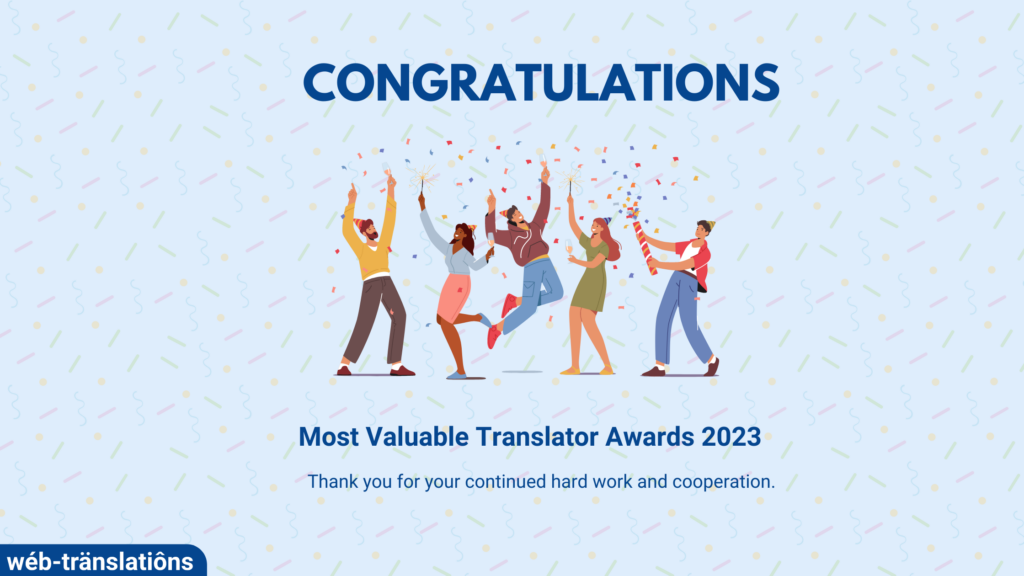
However, the Web-Translations team have been particularly impressed by the below group of linguists this year. Some have provided invaluable assistance on urgent projects, while others have consistently provided high-quality contributions for our key client accounts. Their professionalism, communication and translation talent is second to none and does not go unnoticed.
Please join us in congratulating the following 15 linguists (listed in alphabetical order):
- Axel Couton
- Basel Jbaily
- Carles Hernandez
- Cassandra Herrmann
- Christina Pauly
- Gizem Kartum
- Ingrid Devanne
- Katrin Jarvis
- Laura Mussutto
- Nanda Weiland
- Octavian Blenchea
- Pablo Montero Llano
- Rafael Molina Pulgar
- Thomas Carlsen
- Yookyeng Jeon
Thank you from the bottom of our hearts! We look forward to working with you, and all of our fantastic linguists, throughout the next year! See you next January for the next Most Valuable Translator Awards.
Love,
The Web-Translations Team
New Year Goals for 2024
Happy New Year! We can’t quite believe we’re in 2024 already! Here’s to a month or so of catching ourselves writing the wrong year in our diaries. It’s been 100 years since the first ever foreign language broadcast on US radio, and it’s already been 20 years since the launch of Facebook! Where on earth has that time gone?
With a new year ahead of us, let’s look at some language-related challenges we can set ourselves! We love a challenge, so we’re excited to see what we can achieve this year.
1. Learn a New Language
We couldn’t leave this one off our list! In 2020, 30 million people attempted to learn a new language, according to Duolingo. We think we can beat that easily! Learning a new language is always such a fun and rewarding adventure, and the new year is always a great time to start. The best part is that there’s no wrong way to learn – find however you work best and keep at it.

2. Find People to Share Goals With
Sharing a New Year’s Resolution with others is a great way to make sure you stick to it. If you have a person or group of people there to help you keep on track, you’ll find it much easier to hold yourself accountable. You can even make a little competition between yourselves to really push one another.
3. Travel
Easily the most exciting entry on this list, and one of our favourites! A new year means new opportunities and new adventures. Whether it’s a weekend away, or a wonderful two-week getaway, take the leap and see the world this year. There’s nothing quite like exploring a new city or country with plenty of new experiences waiting for you.

4. Watch International Films & Shows
This is a great way to immerse yourself in a different culture, and get a feel for how a language sounds. Not only do these movies and shows offer great opportunities to learn, but a lot of them are simply just a fantastic watch. If you’re suck on where to start, take a look at our previous blog posts on our team’s favourite international TV shows. For those of you with a taste for something spooky, we’ve even shared a list of our favourite international horror films for you to enjoy.
5. Get Your Content Translated.
Granted, this is more business-oriented for us, but if you’re looking for a way to open doors to new ventures and a world of new business in 2024, then translate your content! Customers are much more likely to buy a product or service if it is offered to them in their native language. This will allow your immediate and long-term sales to benefit hugely!

A new year bringing in new customers sounds amazing, don’t you think?
Do you have any language-related goals for 2024? We’d love to hear all about them! Let us know what your aims are for the new year on our Twitter or LinkedIn pages.
From the team at Web-Translations, we hope you all have a fantastic 2024!
December Discount
For the month of December, we are offering a 20% discount on all translation projects. So, if you have some content that you’d like to translate, get in touch with us today for a free, no-obligation quotation!
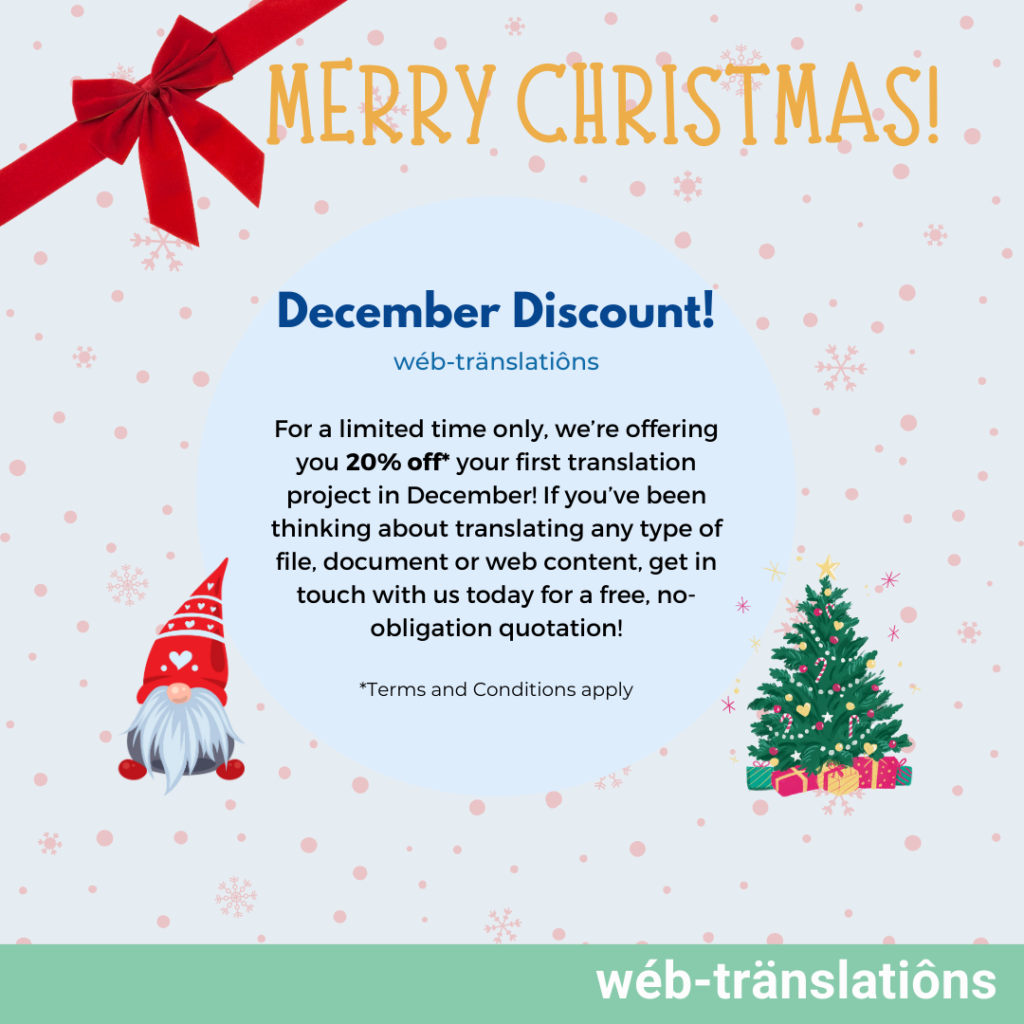
We can offer you:
- A Dedicated Project Manager
- Competitive Translation Rates
- Flexible Payment Terms
Further still, we have a great track record working for clients in a wide range of industries. You can read all about our experience on our portfolio page! Moreover, if you’d like to get to know us more, why not get in touch with our experienced team? That way you can find out what we could do for you.
Terms:
- 20% discount will be applied to our standard rates of translation and proofreading
- Discounts will only be applied to projects exceeding £60
- Furthermore, discounts cannot be applied to Pay-As-You-Go accounts
- This offer is restricted to one order per client
- Please remember that this offer cannot be combined with any other discount
- This offer will expire at 17:00 BST, 31st December 2023
However, if your content isn’t ready for translation, keep an eye out on our social media for future offers. Also, while you’re there, you can also check out our Christmas countdown – we have lots of fun content in store with our very own advent calendar!
Our Top 10 International Horror Films
Halloween is just around the corner! So to get you in the mood for spooky season, we’ve gathered together our top 10 international horror films! So make yourself a hot drink, get yourself comfy and take a look at our top picks!
1. AMERICA – Halloween (Dir. Carpenter, 1978)

One of the first ever slasher movies, Carpenter’s 1978 masterpiece makes it clear why killer Michael Myers is right up there in the horror villain hall of fame. Even today, Michael still makes audiences want to hide behind their sofas without saying a word.
2. UK – The Wicker Man (Dir. Hardy, 1973)
Police Sergeant Howie, a devout Christian, travels to the mysterious Scottish island of Summerisle to investigate the disappearance of a missing child. He soon discovers that the island residents are all practicing ancient pagan rituals, and they claim that the missing child never even existed. As soon as Howie arrives on the island, the mystery will draw you in and keep you guessing, until the horrifying truth is revealed.
3. GERMANY – Blood Red Sky (Dir. Thorwarth, 2021)
What initially appears as a hijacking thriller takes a sudden turn in this high-octane bloodbath in the sky. Single mother Nadja must protect her son Elias from the hijackers, but little do they realise they are the ones that need protecting from Nadja – a vampire trying to find a cure for her condition in America.
4. SOUTH KOREA – Train to Busan (Dir. Yeon, 2016)
Zombie movies feel lazy and sluggish at times, but that is not the case at all here! A mysterious virus has swept through Korea, and a father is taking his daughter from Seoul to Busan on the KTX bullet train. After an infected stowaway makes their way onto the train, each carriage falls one by one to the horde. Just like the infected masses, the action and thrills in this film are unrelenting.
5. RUSSIA – Sputnik (Dir. Abramenko, 2020)
1983, the height of the Cold War. Two Russian astronauts crash on re-entry, with only the commander surviving. However, it soon becomes clear that something has come back to Earth with him. This chilling Russian “Alien” meets “The X-Files” thriller is a great slow burn, with some brilliant moments of sheer dread.
6. NORWAY – Trollhunter (Dir. Øvredal, 2010)
The first of two found-footage entries on this list follows a group of students investigating a series of mysterious bear deaths. At first, they seem to be a result of poachers, but after meeting a mysterious hunter named Hans, the students uncover a whole new terrifying world. Hans is actually a troll hunter working for the Norwegian government, and he must eliminate some particularly dangerous individuals that have escaped their territory.

7. AUSTRIA – Funny Games (Dir. Haneke, 1997)
Anna is home alone in her family’s lakeside cabin while her husband and son are out sailing. Two men introduce themselves as friends of the neighbours, but they soon refuse to leave. When Anna’s husband Georg returns and tries to remove the two men, things turn violent, and the family ends up being held hostage and forced to play horrific games. To make things even worse, one of the invaders even addresses the audience directly, doubling down on the nightmarish situation.
8. ITALY – Suspiria (Dir. Argento, 1977)
Dario Argento’s masterful cinematography. Goblin’s mystifying, unsettling soundtrack. This giant of Italian Giallo Horror follows Suzy Bannion surviving the mysterious Tanz Akademie and all the mind-bending horrors that hide within. You certainly won’t forget this film in a hurry.
9. SPAIN – REC (Dir. Balagueró, Plaza. 2007)
Another found-footage icon, REC follows TV reporter Angela through the lens of her cameraman Pablo as they report on a local Barcelona fire brigade. The duo follows them on a call to a nearby apartment where an old woman is trapped. They are soon trapped inside the building with the other horrified residents, and something else truly evil.
10. AMERICA – Scream (Dir. Craven, 1996)
My answer to Ghostface’s iconic question; “What’s your favourite scary movie?”. Wes Craven’s classic arguably changed the genre forever. Roger L. Jackson’s voice is still as chilling now as it was in 1996 and will have you scared of a ringing phone for a long time after watching.
We hope you enjoy our picks for 10 International Horror Films! If you’ve got any frightful favourites you’d like to share, get in touch with us here or join us on social media!
International Translation Day: Fun Facts
International Translation Day falls on September 30th every year and every year the day seeks to celebrate language professionals whose work plays an important role in bringing together nations.
The day has been in existence since 2017 when the General Assembly of the UN adopted resolution 71/288 to foster peace and it takes place on 30th September in order to celebrate the feast of St Jerome – the Bible translator considered the patron saint of translators.
As a translation agency, we of course couldn’t let this occasion pass by without a little celebration and we wanted to share this celebration with you by offering some translation facts. We hope you enjoy learning a little more about translation.
An Old Profession
Firstly, did you know that translation has been around for centuries? The Old Testament is thought to have been translated into Greek in the 3rd Century BC!
Most Translated Authors
Agatha Christie, Jules Verne and William Shakespeare are the three most translated authors of all time. Three incredible authors, we think you’ll agree!
Latin Roots
The Latin root of ‘translator’ is ‘translatus’ which means to be carried over. Consequently, the literal meaning of translation is to carry something from one place to another.
Most Translated Children’s Book
The most translated children’s story is Le Petit Prince (The Little Prince) by Antoine de Saint-Exupéry. It has been translated into more than 500 languages!
A Dangerous Profession
Did you know that translation used to be quite a dangerous profession? William Tyndale, for example, was executed in Holland in 1536 due to his translation of the Bible into English being labelled as heretic.

We hope you’ve enjoyed learning a few translation facts! If you have any facts that you’d like to share, please reach out on social media. Equally, if you have any projects that you require our assistance with, please get in touch!
Lifting the Lid on Subtitling Templates
Need your video to be available in multiple languages? Want to show your customers that you invest in them? Don’t fret, at Web-Translations, we are able to add multilingual subtitles to your video content but can reduce turnaround time and cost. For more information on our subtitling service, take a look at our recent blog.
Subtitling for multiple languages can be time-consuming and the cost can add up. However, we can use templates to help save you time and money. Read on to find out more about Subtitling Templates.
What is a Subtitling Template?
Subtitling templates are the transcription of a video’s dialogue and on-screen text. This is done in the language of the video, also known as the source language. But why do need this you may be asking? Why can’t the video just be translated straight into the target languages? Well, when a video is being subtitled the audio needs to be transcribed to create a script. Using this script, the linguists can then add timecodes to each phrase. They also ensure that the timing of the subtitle is aligned with both the video and audio. The linguists can then move onto translating the script, and make any tweaks to the timings. This depends on how the language has expanded or contracted.
Types of templates
Templates can be either locked or unlocked. Locked templates mean that the subtitler cannot amend the timecodes and will just translate the subtitles. This allows for a quicker turnaround, as the linguists won’t need to spend time adjusting the in and out times. Unlocked templates, however, provide the linguist with a base, but allows them to amend the subtitles accordingly.
There are also another two types of template: original language and pivot language. This depends on the language of the video. Original language templates are a time-coded intralingual transcription which is then translated into the target languages. Pivot language templates, however, are a time-coded transcription in a third language. This third language is typically English, and it serves as an intermediary between the source and target languages. For example, if you have a video in Malay, it may be difficult to find linguists to translate into French and Spanish. However, by using a pivot language template, you can have one linguist translating the Malay into English. Then you have linguists translate the template from English into French and Spanish. This is particularly useful for those less common languages.
Although pivot templates mean that less common language videos can be accessible to a wider audience, aspects of the original culture could be lost. After all, the English to French translator may not understand Malay. But this is where annotations come in. A native speaker of the source language creates these annotations. They may note cultural references, the meaning of shortened words, cases of wordplay, puns and jokes. But they may also highlight the use of slang, tone of voice and meaningful names. These annotations mean that the translated subtitles are as close to the original as possible.

Why is Using a Subtitling Template Beneficial?
By creating a template, there are various advantages. We’ve listed some of these below:
- The subtitling process is more efficient, as the video is only transcribed once. This means that the turnaround times are reduced, and you save time.
- The content is standardised across all languages within the project. Therefore each set of subtitles will be consistent.
- As you only need to pay for one template to be created, rather than transcriptions for each language, this allows for a reduced cost, saving you money.
- Quality is assured across all languages, as a native speaker of the original language creates the template. This means that the transcription would be accurate.
- A template also ensures cultural and linguistic accuracy. The native linguist is aware of cultural references. For example, meaningful names, certain monuments, and particular food that is eaten at a certain time.
We hope this blog answers any questions about Subtitling Templates. If you do have any other questions, please get in touch via our contact page or social media.
Fancy learning more about the world of translation? Why not check out our blog lifting the lid on Proofreading?
Mental Health Awareness: Top Tips
May is Mental Health Awareness Month in the UK. It is a time dedicated to raising awareness of mental health, the struggles it can cause, as well as provide tips to help look after our own mental health.
As a company, Web-Translations works with freelancers on a daily basis. Working from home can be isolating as you may spend days without talking to another person, and communication is often done via email. At Web-Translations, we also work from home, and we have acknowledged how important our mental health really is. This is why we want to take a moment to raise awareness and share some tips that may help.
This week we will be sharing some ideas of how to look after your mental health, some translated mindful books and even some tips for how to respect mental health when marketing international campaigns. But for today here are some of our top tips to looking after your mental wellbeing:
Take breaks
Taking breaks is so important to allow ourselves some time to recharge. It can be a short 5-minute break, or even a 2-week long holiday, but just taking time to relax is really beneficial. Although we may think that working non-stop every day means that we will achieve our full potential, this is not the case. Breaks reduce exhaustion and increase energy levels, which in turn will allow for increased productivity.
15 minutes in nature
Nature is an amazing tool for helping our mental health, and it’s literally on our doorstep. Starting your day in nature is proven to be grounding and allows for a relaxed start to the day. I personally like to drink my morning cup of tea outside and set myself up for the day ahead.

Set boundaries and learn to say no
Similarly, it’s difficult to say no and set boundaries in our daily lives. Whether it’s meeting up with friends, taking on a task that’s too much or you don’t have time for, or even feeling guilty when we need to take a sick day at work. But it’s time to look after our own mental wellbeing and start to say no to the things that we don’t have time to do. Or maybe start saying no to the things that we don’t want to do. We are all different and that’s okay.
Mobile-free hour
Technology has allowed society to advance to levels that we didn’t think were possible 20 years ago. However, it has also contributed negatively to mental health in some cases. Not only does it allow for us to easily compare ourselves with others on social media, but many people rely on technology every day. It’s often the first thing that we reach for when we wake up and then last thing that we see before we go to sleep. By starting your day with a mobile-free hour, you don’t wake up to a stressful email and you don’t see the list of tasks that people are asking you to do throughout the day. You can begin the day as you want to.

Exercise
Exercise has been scientifically proven to boost our mood and reduce stress levels. This can play an important part in the care of our mental health. You could go on a walk, go to a dance class, hit the gym, or even do some yoga. Find an exercise that you enjoy and maybe find a group to join too.
Check in with colleagues and family members
A simple smile or ‘how are you doing?’ can go a really long way, especially if someone is struggling. You can never know what’s really going on in someone’s life, so checking in is a great way top help people feel that they can talk to you.
Pet cuddles
Pets are amazing at improving mental health. Although they have no way of communicating verbally, their affection and actions can speak a thousand words. If you’re having a bad day, they are there to cry on. If you have had a stressful call, they are there to listen to you. And they are there to bring a smile to your face when they want to play with their favourite toy.
Below you will see our furry friends – Colyn, Clive, Tommy and Lola. They always put a smile on our faces.
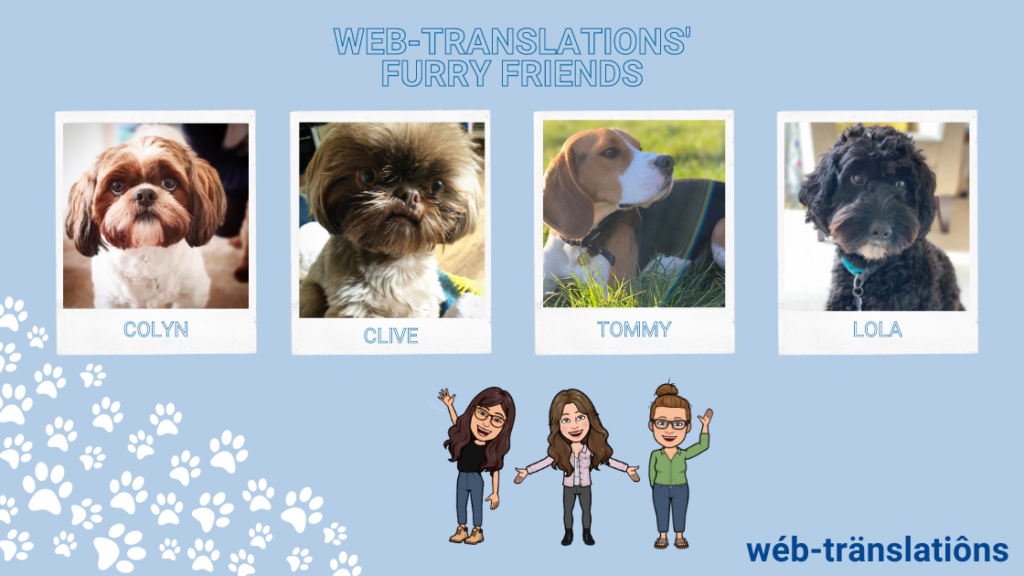
We hope these tips can help you care for your mental health. Also keep an eye on our social media for more mental health related content.
Lifting the Lid on Desktop Publishing
Do you need to translate PDFs, brochures, or other carefully designed content? And have you considered that the layout of these translations may need to change slightly in order to accommodate longer texts, or right-to-left languages?
There’s no need to worry, as we offer a desktop publishing service that will help. Read on to find out how we can help you create perfectly localised materials for print or download.
What is Desktop Publishing?
If you haven’t heard of the term desktop publishing before, you may have heard it referred to as typesetting or DTP. This process involves using design software, such as InDesign, to create files with customisable layouts for print or download.
Simply translating an IDML file export won’t mean that your translated file is ready for printing right away. A specialist designer needs to import the translated file into InDesign, and make any changes. These changes can include:
- Lengthening text boxes
- Changing font sizes
- Tweaking elements
- Adding line breaks
- Formatting embedded graphics
The aim of this process is to make the translated file look as good as the original, whilst avoiding the ‘this has been translated’ look.
The Process
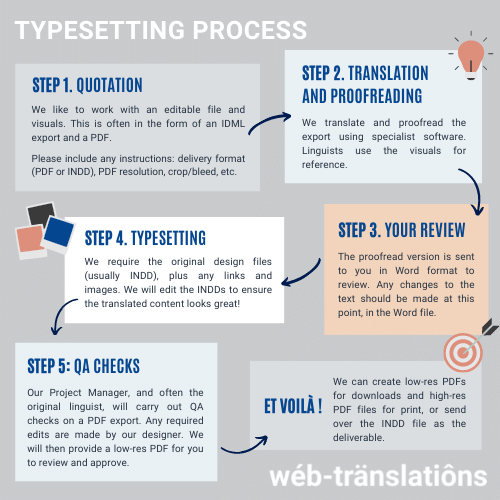
Why use Web-Translations?
Text could expand or contract by around 25% once it has been translated. This may cause some issues when trying to retain the original file’s formatting and layout. If you haven’t planned for this in advance, our designer may need to reduce a font size or increase the size of a text box, for example.
Non-Latin alphabets can also be difficult to work with for the uninitiated. One example of this is Arabic, which reads from right to left. This means that the entire page layout needs to be reversed. As most designers don’t have experience with translation and probably don’t speak the language of the target text, it can be difficult for them to rework the layout and format of the translation. In fact, some designers may even introduce errors to the translated content, as they are not translators themselves. At Web-Translations, however, we could save your designer’s both time and effort, as we have the skill to adjust the formatting and page layout of your translations ready for print.
Our experienced typesetters can tackle anything from business cards to technical manuals, and from packaging to posters, so it’s safe to say that your content is in good hands. But if you’re in the process of designing new marketing collateral for translation, check out our blog post on translating PDFs for some pointers.
Differences Between Languages
As we mentioned earlier, texts can become considerably shorter or longer during the translation process, as each language has its own structure and set of characteristics. Below we’ve provided a few examples of how much some languages can expand or contract when translating from English:
| Language | Average Expansion/ Contraction |
|---|---|
| French | 20% longer |
| German | 20% longer |
| Korean | 10% shorter |
| Swedish | 10% shorter |
| Arabic | 25% longer |
| Spanish | 20-30% longer |
| Finnish | 30% shorter |
| Norwegian | 15% shorter |
We hope these figures give you a better idea of the differences between the languages, and that you’ll be able to bear this in mind when creating your carefully designed documents.
To find out more about our language solutions, please visit our Services page. Or, if you’d like to talk to us directly, why don’t you fill in our contact form? We’re more than happy to help.
Meet the Team – Lauren Hill
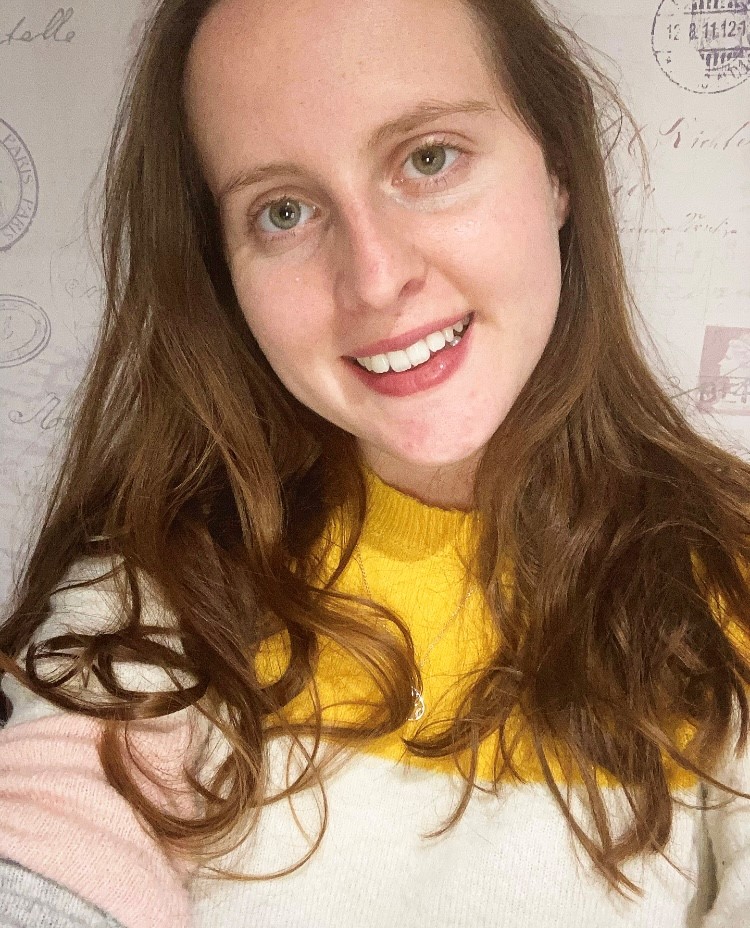
Hi Everyone,
My name is Lauren Hill (not the singer unfortunately). I’ve just joined the Web-Translations Team as a Project Coordinator! I graduated from Swansea University with a Distinction in my Masters in Professional Translation in 2020. Since then, I’ve been working in a French and German customer service role within the automotive sector. I look forward to using not only the knowledge from my translation degrees, but also continuing to use my customer service experience within the translation industry.
I have always loved languages – the different structures and the cultures they belong to. This is why I continued my language journey at university. I studied for a BA in Modern Languages, Translation and Interpreting, where I studied the theoretical concepts of translation and interpreting, along with French and German. After graduating with a First Class Honours, I wanted to focus on translation in particular and decided to study for my Masters. During my MA, I specialised in translation technology as well as audiovisual translation. This is where I found a love for project managing, as I managed a fictious translation company. I thoroughly enjoyed the challenge and look forward to continuing this professionally.
Studying languages and translation has also offered me some amazing opportunities. I have studied at university in the big, beautiful (yet expensive) city of Geneva and in the small German village of Germersheim. I have also spent some time at German summer schools, studying in Kiel and Düsseldorf. This allowed me to meet people from all over the world and learn about various cultures. Aside from academia, my language skills have also allowed me to work in different roles. The first was as a German to English translator for a German company working within the thermal oil industry. Another role was working in customer service, where no two days would ever be the same.
When I’m not working or studying, I love to go on walks in nature and spend time with my two dogs, Colyn and Clive. I also enjoy reading various styles of books. As a language lover, I of course love to learn new languages – I’m currently learning Turkish.
I’m looking forward to using my skills and knowledge in my new role at Web-Translations, and really look forward to meeting our linguists, and clients, both old and new.
Meet the Team – Charlotte Graver

Hi everyone,
I’m Charlotte, and I have recently joined the Web-Translations team as a Project Coordinator. Having just finished my Masters in Spanish to English Translation at Lancaster University, I’m really excited to start my career in the language industry, putting into practice all that I have learnt during my university studies and building upon such skills.
Although my MA centred upon the theoretical aspects of Translation Studies – with one module even allowing me to delve into the rather complex realm of neurolinguistics – my studies equally enabled me to practise translation first-hand. The clearest example of this is my dissertation. Here I translated a contemporary Mexican children’s story and analysed the extent to which we can foreignize macabre culture-bound references, ultimately confronting notions of taboos in literature.
Prior to my Masters, I obtained a First-Class Honours Degree in Spanish Studies and History. Whilst equally based in Lancaster, I did tread further afield as I spent a year teaching English in the very rainy yet incredibly beautiful Galicia. Whether it be walking parts of the Camino de Santiago, eating a mountain of empanadas, or attempting to learn some basic Galician by reading the poetry of Rosalía de Castro, I fell in love with the culture and realised that, in whichever direction my career path lead, languages and culture had to be at the heart of it.
As my dissertation and year abroad illustrate, literature is one of my greatest passions and my dream is to one day translate a novel myself. In the meantime, however, I am thoroughly committed to my new role as a Project Coordinator. Having completed an internship with another Language Service Provider during my MA, I am excited to be diving back into the vibrant language service industry and, what is more, starting my journey at Web-Translations.
First Time Exporters: Full Support for your Website Translation
As the liberalisation of global commerce continues, more and more companies are joining the international market every year. Exporting has traditionally been seen as one of the most risky, and expensive ways to grow a business. While there are many pitfalls and challenges when trading internationally, the Internet offers an excellent way for you to reach out and grow your market share, without investing millions.
Global trade has never been so easy with the First time Exporters Guide. By working with Web-Translations you will have a partner to help you at every stage in your journey. We combine years of experience, with top-quality language and web skills to offer a hand-held, strategic approach to boosting your global trade.
(more…)
ZSL London Zoo is Olympic ready and diving from new heights
The 2012 London Olympics represents a great sales opportunity. Visitors from all over the world will be visiting UK this year, some businesses are seizing this opportunity to maximise their slice of the action.
The Olympic Gold Website Package was launched this month by Web-Translations to Get Businesses Fit for London 2012.
By giving customers extra peace of mind when offering translated information, you’ll win their trust, and ultimately their custom.
W-T translate website for ZSL London Zoo
“At ZSL London Zoo we use Web-Translations to communicate key messages to our visitors from across the world.
The key pages we selected were translated quickly and accurately and have been a huge benefit.
Key pages such as how to find us, opening times and prices were translated into five key languages based on our visitors countries.
We have used Web-Translations for a number of years and find them helpful and efficient.”
Daniel Sprawson – Digital Communications Manager – ZSL London Zoo
"Excellent" customer service for The BrookLodge Hotel & Wells Spa
“The work was completed extremely quickly, and the customer service I received from the team was excellent. Our website is now multilingual, which has greatly assisted in our on-going campaign to attract more overseas visitors to the BrookLodge and I intend to add more languages to expand on this success. I would definitely recommend to all hotels based in the UK and Ireland that they localise their websites to ensure that they have the best possible chance in a highly competitive market.”
Eoin Doyle, Director – The BrookLodge & Wells Spa
Olympic Gold Website Package – Fit for London 2012
Get Fit for London 2012 with the recently launched Olympic Gold Website Package by Web-Translations.
The 2012 London Olympics represents a great sales opportunity. As mentioned in the Getting Fit for the Olympics blog post published last week not everyone is capitalising on this sales opportunity. Do you want to go for Gold in the 2012 London Olympics?
Last year the largest ever campaign by a national tourist board was launched by VisitBritain; the £100 million GREAT Britain You’re Invited campaign. Primarily fronted by five major global celebrities who agreed to film TV ads and help promote Britain overseas.
As VisitBritain’s Mark Di-Toro says, “Now is the time to wave the British flag”. Thanks to the GREAT campaign a global audience of billions will have their eyes firmly set on Britain like never before. Will you be profiting from this interest?
Global steel company Outokumpu relies on Web-Translations for high quality translations
“We use Web-Translations for all our translation projects, and get excellent service. The nature of many of our texts is very technical, but Web-Translations is more than capable of providing translations that are up to our high standard. We review these internally, and therefore know that the quality of technical translation is very good.
Web-Translations is prompt and reliable, which means that we at Outokumpu can direct our energies elsewhere, knowing our translation projects are in good hands.
I also find the pricing very competitive for the level of service we require and receive.”
Nora Berg, Communications Officer – External Communications – Outokumpu Oyj
Web-Translations says ¡Hola! to a new Madrid office
With the recent changes in Spain comes new opportunities and a new office for Web-Translations in Madrid. Spain may be going through some economic pain, but the fact remains it is the best placed European country for helping businesses to make the most of the fast emerging markets of Latin America, or any of the 27 countries for which Spanish is an official language.
Ignacio de Pablo, an experienced localisation consultant, will head up the Madrid office and spreading the word about Web-Translations among local contacts and partners who recognised the need to export as a strategy to grow. (more…)
Meet the Team – Fiona Henderson
I’m Fiona Henderson and I have just joined the Web-Translations team as a Project Coordinator.
I was born in Edinburgh and grew up in the nearby seaside town of North Berwick. After studying Russian and Slavonic Studies at the University of Glasgow, I moved to Leeds to study towards an MA in Applied Translation Studies at the University of Leeds.
I’m delighted to have found a position which allows me to engage with my knowledge of languages on a daily basis, whilst learning new skills and building on my experience in this exciting and constantly evolving industry.
Other facts about me: I am extremely musical and love going to the theatre to watch an opera or ballet, or to listen to some classical music. I am not very sporty but I do enjoy horse riding, ice skating and dancing. My dream is to take the Trans-Siberian Railway from Moscow to Vladivostok!
We've Taken The Plunge Into Bath!
We’ve expanded Web-Translations and opened an office in Bath to meet the needs of our growing portfolio.
Andrew Carter (pictured right, below) who has been with us for over 2 years as a freelancer, has now become a full-time employee, and is heading up the new satellite office with his latest recruit, Jonathan Power (pictured left).
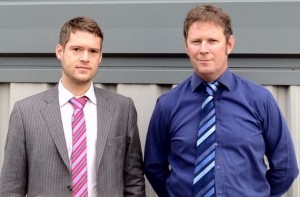 Andrew says: “I worked with Web-Translations on a freelance basis for 2 years, and became a full-time employee just a few months ago. I enjoy working with a wide variety of clients, and love knowing that whatever their aims are we have a product in our multilingual website “toolkit” that will help them succeed in international markets.” (more…)
Andrew says: “I worked with Web-Translations on a freelance basis for 2 years, and became a full-time employee just a few months ago. I enjoy working with a wide variety of clients, and love knowing that whatever their aims are we have a product in our multilingual website “toolkit” that will help them succeed in international markets.” (more…)
Friends of Web-Translations – thanks for coming!
We had a great night last Thursday at our first Friends of Web-Translations event, so a big thank you to all those who were able to make it.






